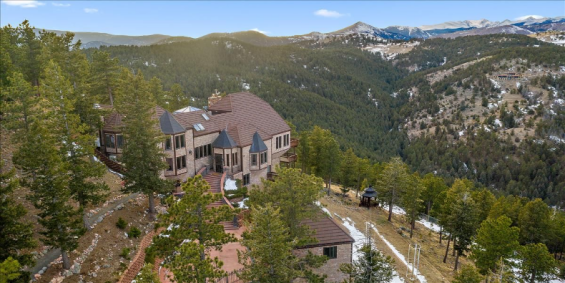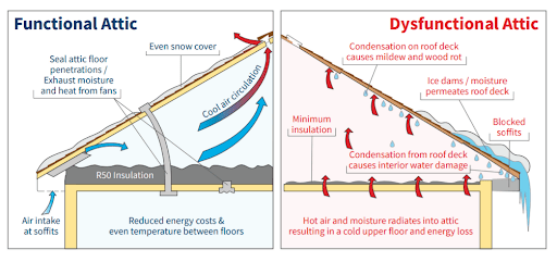THE LATEST IN ROOFING

A snow-covered roof makes for a picturesque winter scene, but for homeowners in snow-prone regions, heavy winter snow loads on the roof can cause major problems. Ice dams, freezing temperatures and repeated freeze/thaw cycles can take a devastating toll on the roof.
Fortunately, there are roofing materials engineered to withstand the harsh conditions of blustery weather.
If you’re looking for the best type of roof for snow, you’re looking for a roofing material with these three features:
· Lightweight and able to withstand heavy snow loads.
· Non-porous and resistant to freeze/thaw cycles.
· Provides ventilation underneath the roof.
We’ll cover each of these features in detail below, but first, let’s discuss why snow can be so damaging to the roof.
Weighing as much as 20 pounds per cubic foot, snow can add a substantial amount of weight to a roof. Heavy snow loads that cause ice dams can add even more weight–hundreds of pounds, in fact.
Ice dams are created when heat from the attic rises and melts the snow on the roof. The meltwater flows down to the overhang where it refreezes. This ongoing process causes ice to build up, resulting in a dam that prevents proper water drainage from the roof.

If water can’t drain from the roof, the pooled water can get under the roof causing cracks, leaks and other water damage. Worse, freezing temperatures exacerbate the problem because when water freezes, it expands, which can put extreme pressure on porous roofing materials.
Here’s why a lightweight and non-porous roofing material is best for snow.
As mentioned above, snow and ice dams can add a substantial amount of weight to the roof.
Excessive weight on the roof can cause warping and buckling from bearing the heavy weight of sudden snow accumulation.
As one of the heaviest roofing materials, asphalt shingles and clay tiles are especially prone to weight issues. For example, the weight of snow and heavy asphalt shingles can cause roof truss failure. And since clay tile roofs can absorb up to 15% of their weight in moisture, they may need additional reinforcement and construction to withstand heavy snow loads.
A durable and lightweight roof, such as metal roofing, adds reinforcing shear strength to the roof deck without adding additional weight. Additionally, the non-porous nature of metal roofs means that snow and ice typically slide right off the roof before it can accumulate.
There are other benefits to a non-porous roof that homeowners should consider as well.
A porous roof will absorb water. As mentioned above, when water freezes, it expands.
This expansion puts pressure on the roofing material and, after repeated freeze/thaw cycles, can cause porous roofing materials to crack, split, warp and deteriorate.
Snow and ice can also work their way through porous roofing materials and penetrate the underlying roof deck. As winter temperatures fluctuate above and below freezing, expansion and contraction stresses kick in.
This can result in buckling and warping of the roof deck, causing damage to the roof deck and interior of the home. Worse, the damage to the roof deck may not be apparent until much later when thawing temperatures reveal the damage.
Traditional roofing materials, such as asphalt shingles, clay tiles and wood shake, are porous and may not be the best choice for homes in snow-prone regions.
A metal roof, on the other hand, is non-porous and impervious to both snow and water.
While preventing water from penetrating the roof is crucial, it’s equally important to let cold air in.
Ventilation under the roof will keep the cold outside air circulating throughout the attic and prevent the air from warming above the freezing point. Warm air rising from the attic and melting the snow on the roof causes ice dams to form.
When the roof temperature is consistent from the highest ridge to the lowest eave, snow and ice can’t pile up to form ice dams.
Proper ventilation under the roof requires air space, so look for a roofing material that can be installed:
· On battens.
· Directly to the roof deck and has built-in airspace of at least ¾”.
What you don’t want is a roofing material that is attached to the deck without any underlying airspace. Asphalt shingles, for example, are nailed directly to the roof deck and don’t provide any space for airflow.
Additionally, asphalt shingles aren’t the best choice if you’re looking to have your roof replaced in temperatures below 45 degrees F. Asphalt shingles become hard and brittle at colder temperatures and can shatter. Some asphalt shingle warranties can actually be voided if the roof is installed at temperatures below 40 degrees.
Metal roofing products, such as SANGOBUILD Metal Roofing, can be installed either on battens or direct-to-deck with the proper amount of airspace. They can also be installed year-round, even in freezing temperatures.
A lightweight, non-porous and durable stone-coated SANGOBUILD metal roof is engineered to withstand snow, freezing temperatures, ice dams and endure harsh weather conditions for decades.
SANGOBUILD Metal Roofing products have withstood some of the harshest weather around the world, including snow, blizzards, hurricanes, tornados, hail and nearly anything Mother Nature has to offer.
Other benefits of a SANGOBUILD metal roof include:
· Longevity: Metal roofs last two to three times longer than asphalt shingles.
· Energy-Efficient: Metal roofs can reduce energy costs by up to 25%.
· Low Maintenance: Metal roofs don’t require expensive upkeep or frequent repairs.



REQUEST A QUOTE
Copyright © Hangzhou Singer Building Materials Co., Ltd. All Rights Reserved |
Sitemap
| Powered by 
SEOKeywords:Roof Tile ManufacturerRoof Shingle ManufacturerAsphalt Shingle SupplierRain Gutter CompanyShingle Roofing CompanyWaterproof Tape For RoofPressed Steel Roofing TilesRain Gutter SystemGray Asphalt ShingleStone Coated Metal Roofing Manufacturer